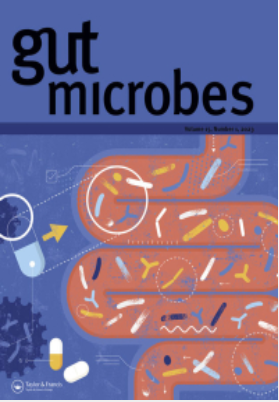ADP-庚糖可减轻幽门螺旋杆菌诱导的树突状细胞活化。
IF 12.2
1区 医学
Q1 GASTROENTEROLOGY & HEPATOLOGY
引用次数: 0
摘要
复杂的免疫逃避策略使幽门螺杆菌(H. pylori)得以在全球约一半人口的胃黏膜上定植。持续感染和由此引起的慢性炎症是导致胃癌的主要原因。为了了解幽门螺杆菌与宿主免疫之间错综复杂的相互作用,研究人员利用空间图谱监测幽门螺杆菌感染胃组织中的免疫细胞。在胃有机体/免疫细胞共培养物中进一步研究了树突状细胞(DC)和T细胞的表型,并通过人类DC的蛋白质组学研究获得了机制方面的见解。在这里,我们发现 ADP-庚糖--一种最初被报道为真正的 PAMP 的细菌代谢产物--降低了幽门螺杆菌诱导的 DC 成熟和随后的 T 细胞反应。从机理上讲,我们报告了幽门螺杆菌摄取ADP-庚糖缺陷的幽门螺杆菌菌株以及随后的DC活化依赖于TLR2。此外,在幽门螺杆菌感染的情况下,ADP-庚糖会通过影响 I 型 IFN 信号转导来减弱原代人类 DC 的全面激活。这项研究揭示了ADP-庚糖在幽门螺杆菌感染过程中减轻宿主免疫力的作用。本文章由计算机程序翻译,如有差异,请以英文原文为准。
ADP-heptose attenuates Helicobacter pylori-induced dendritic cell activation.
Sophisticated immune evasion strategies enable Helicobacter pylori (H. pylori) to colonize the gastric mucosa of approximately half of the world's population. Persistent infection and the resulting chronic inflammation are a major cause of gastric cancer. To understand the intricate interplay between H. pylori and host immunity, spatial profiling was used to monitor immune cells in H. pylori infected gastric tissue. Dendritic cell (DC) and T cell phenotypes were further investigated in gastric organoid/immune cell co-cultures and mechanistic insights were acquired by proteomics of human DCs. Here, we show that ADP-heptose, a bacterial metabolite originally reported to act as a bona fide PAMP, reduces H. pylori-induced DC maturation and subsequent T cell responses. Mechanistically, we report that H. pylori uptake and subsequent DC activation by an ADP-heptose deficient H. pylori strain depends on TLR2. Moreover, ADP-heptose attenuates full-fledged activation of primary human DCs in the context of H. pylori infection by impairing type I IFN signaling. This study reveals that ADP-heptose mitigates host immunity during H. pylori infection.
求助全文
通过发布文献求助,成功后即可免费获取论文全文。
去求助
来源期刊

Gut Microbes
Medicine-Microbiology (medical)
CiteScore
18.20
自引率
3.30%
发文量
196
审稿时长
10 weeks
期刊介绍:
The intestinal microbiota plays a crucial role in human physiology, influencing various aspects of health and disease such as nutrition, obesity, brain function, allergic responses, immunity, inflammatory bowel disease, irritable bowel syndrome, cancer development, cardiac disease, liver disease, and more.
Gut Microbes serves as a platform for showcasing and discussing state-of-the-art research related to the microorganisms present in the intestine. The journal emphasizes mechanistic and cause-and-effect studies. Additionally, it has a counterpart, Gut Microbes Reports, which places a greater focus on emerging topics and comparative and incremental studies.
 求助内容:
求助内容: 应助结果提醒方式:
应助结果提醒方式:


